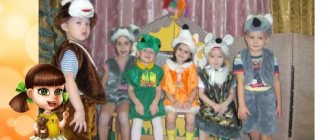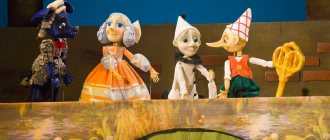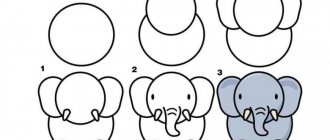Circle work. Theatrical and musical circle "Fidgets". Monitoring
Daria Popova
Circle work. Theatrical and musical circle "Fidgets". Monitoring
Theatrical-game and musical-rhythmic activities of children
The first week is devoted to the basics of dramatic theater and musical and rhythmic movements. The teacher evaluates the children’s diction, gestures, facial expressions, and movements. Observes and evaluates their participation in dramatization games.
The second week is devoted to the basics of puppet theater. The teacher evaluates children's ability to control puppets of various systems and observes how children perform roles in a puppet show.
Sketch training . (The skill of an actor).
1. Diction (rhymes, tongue twisters, tongue twisters).
2. Gestures (studies on the expressiveness of gestures, including “Tell poetry with your hands”).
3. Facial expressions (studies on the expression of basic emotions, comparison of various emotions, reproduction of individual character traits).
4. Movements (studies with musical accompaniment).
Puppet shows.
1. The desire to participate in a puppet show.
2. The ability to interact with a partner using dolls of different systems.
3. The ability to create an image using a doll of a certain system.
Sketches with dolls.
1. The desire to participate in the game-play.
2. Ability to work with a partner.
3. The ability to create an image of a character using various means of expression (words, gestures, facial expressions, movements, puppets of various systems).
Dramatization games.
1. The desire to participate in dramatization games.
2. The ability to communicate with a partner.
3. The ability to improvise in creating an image.
Musical and rhythmic movements.
1. The ability to move in accordance with the diverse nature of music and musical images.
2. The ability to independently begin movements after entry, to actively participate in performing creative tasks.
3. The desire to dance expressively and rhythmically.
Assessment of children's knowledge, skills and abilities:
“Excellent” – the child’s creative activity, independence, initiative, quick comprehension of a task, accurate expressive execution without the help of an adult, pronounced emotionality (in all types of musical and theatrical activities).
“Good” – emotional responsiveness, interest in musical and theatrical activities, desire to get involved in them, despite some difficulties in completing the task. The child needs the help of a teacher, additional explanation, demonstration, and repeated repetitions.
“Satisfactory” – the child is a little emotional; evenly, calmly relates to musical and theatrical activities, does not show active interest, is indifferent, and is not capable of independence.
“Unsatisfactory” - (a rare assessment) - a child’s negative attitude towards musical and theatrical activities, usually associated with deviations in his health or with pedagogical neglect (usually due to the fault of the family)
Legend : “excellent” “satisfactory”; "Fine"; "unsatisfactory"
Preparatory group. Senior preschool age. Children 6-7 years old
Master class on the application “Christmas tree from paper circles” for children of senior preschool age
Objectives: - expand ideas about winter, the New Year holiday, the Christmas tree as a symbol of celebrating the New Year; — improve technical skills and skills in working with paper ; - strengthen the skills of folding paper and using scissors correctly; - develop creative...
Photo report on circle work in mathematics in December (preparatory group)
Modern achievements require a person to think abstractly, which means it is necessary to develop the logical thinking of preschool children. Organizations of "Entertaining Mathematics" club
makes it possible to develop cognitive activity, interest in mathematics, develop...



